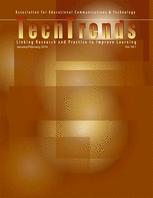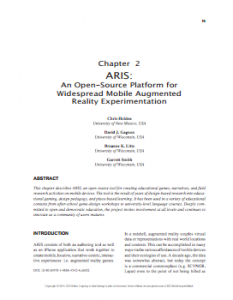Our team just finished a collaborative article with Kurt Squire of the Games+Learning+Society research center and Seann Dikkers, a UW Alum and Associate Prof. at Ohio University.
“Participatory Scaling Through Augmented Reality Learning Through Local Games”
The proliferation of broadband mobile devices, which many students bring to school with them as mobile phones, makes the widespread adoption of AR pedagogies a possibility, but pedagogical, distribution, and training models are needed to make this innovation an integrated part of education, This paper employs Social Construction of Technology (SCOT) to argue for a participatory model of scaling by key stakeholders groups (students, teachers, researchers, administrators), and demonstrates through various cases how ARIS (arisgames.org) — a free, open-source tool for educators to create and disseminate mobile AR learning experiences — may be such a model.
Get the whole article at http://link.springer.com/article/10.1007%2Fs11528-013-0718-1



